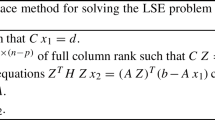Abstract
A new recursive algorithm for the least squares problem subject to linear equality and inequality constraints is presented. It is applicable for problems with a large number of inequalities. The algorithm combines three types of recursion: time-, order-, and active-set-recursion. Each recursion step has time-complexity \(O(d^2)\), where \(d\) is the dimension of the data vectors. An \(O(d^2)\)-refreshment of the corresponding inverse matrices after each time-period of length \(d\) makes the algorithm numerically very stable, such that it can handle arbitrarily many data vectors without significant rounding errors. Processing a new data vector (which usually only slightly changes the instance of the optimization problem) has time complexity \(O(d^2)\), provided that the active set method only requires \(O(1)\) steps for the update until the optimum is found. In a series of examples with randomly generated data sets and with either convex constraints or with randomly generated linear constraints, the set of active constraints remains relatively stable after the inclusion of each new data vector.


Similar content being viewed by others
References
Haykin S (2000) Adaptive filter theory. Prentice-Hall, Englewood Cliffs
Sayed AH (2003) Fundamentals of adaptive filtering. Wiley, Hoboken
Plackett RE (1950) Some theorems in least squares. Biometrika 37:149
Woodbury M (1950) Inverting modified matrices, Memo Report 42. Statistical Research Group Princeton University, Princeton
Ljung L, Morf M, Falconer D (1978) Fast calculations of gain matrices for recursive estimation schemes. Int J Control 27:1–19
Carayannis G, Manolakis D, Kalouptsidis N (1983) A fast sequential algorithm for least-squares filtering and prediction. IEEE Trans Acoust Speech Signal Process 31:1394–1402
Cioffi JM, Kailath T (1984) Fast recursive least-squares transversal filters for adaptive filtering. IEEE Trans Acoust Speech Signal Process 32:304–307
Fabre P, Gueguen C (1986) Improvement of the fast recursive least-squares algorithms via normalization: a comparative study. IEEE Trans Acoust Speech Signal Process 34:296–308
Griffiths LJ (1969) A simple adaptive algorithm for real-time processing in antenna arrays. Proc IEEE 57:1696–1704
Frost OL (1972) An algorithm for linearly constrained adaptive array processing. Proc IEEE 60:926–935
de Campos MLR, Werner S, Apolinário JA Jr (2004) Constrained adaptive filters. In: Chrandran S (ed) Adaptive antenna array: trends and applications. Springer, New-York
Arablouei R, Doğançay K (2012) Reduced-complexity constrained recursive least-squares adaptive filtering algorithm. IEEE Trans Signal Process 60(12):6687–6692
Elden L (1980) Perturbation Theory for least squares problem with linear equality constraints. SIAM J Numer Anal 17:338–350
Griffiths LJ, Jim CW (1982) An alternative approach to linearly constrained adaptive beamforming. IEEE Trans Antennas Propag 30:27–34
Bjorck A (1984) A general updating algorithm for constrained linear least squares problems. SIAM J Sci Stat Comput 5:394–402
Barlow JL, Nichols NK, Plemmons RJ (1988) Iterative methods for equality-constrained least squares problems. SIAM J Sci Stat Comput 9:892–906
James D (1992) Implicit nullspace iterative methods for constrained least squares problems. SIAM J Matrix Anal Appl 13:962–978
Dax A (1993) On row relaxation methods for large constrained least squares problems. J Sci Comput 14:570–584
Gulliksson M (1994) Iterative refinement for constrained and weighted least squares. BIT Numer Math 34:239–253
Resende LS, Romano JMT, Bellanger MG (1996) A fast least-squares algorithm for linearly constrained adaptive filtering. IEEE Trans Signal Process 44:1168–1174
de Campos MLR, Werner S, Apolinário JA Jr (2002) Constrained adaptation algorithms employing Householder transformation. IEEE Trans Signal Process 50:2187–2195
Werner S, Apolinário JA Jr, de Campos MLR, Diniz PSR (2005) Low-complexity constrained affine-projection algorithms. IEEE Trans Signal Process 53:4545–4555
Dijan VI (2006) Multichannel parallelizable sliding window RLS and fast RLS algorithms with linear constraints. Signal Process 86:776–791
Zhu Y, Li XR (2007) Recursive least squares with linear constraints. Commun Inf Syst 7:287–312
Lawson CL, Hanson RJ (1995) Solving least squares problems. SIAM, Philadelphia
Bjorck A (1996) Numerical methods for least squares problems. SIAM, Philadelphia
Alt W (2002) Nichtlineare Optimierung. Vieweg, Braunschweig/Wiesbaden
Nocedal J, Wright SJ (2006) Numerical optimization. Springer, New-York
Gollamudi S, Nagaraj S, Kapoor S, Huang Y-F (1998) Set-membership filtering and a set-membership normalized LMS algorithm with an adaptive step size. IEEE Signal Process Lett 5:111–114
Samson C (1982) A unified treatment of fast algorithms for identification. Int J Control 35:909–934
Lev-Ari H, Kailath T, Cioffi JM (1984) Least-squares adaptive lattice and transversal filters: a unified geometric theory. IEEE Trans Inf Theory 30:222–236
Sayed AH, Kailath T (1992) Structured matrices and fast RLS adaptive filtering. In: Proceedings of the 2nd IFAC Workshop on Algorithms and Architectures for real-time control, Seoul, pp 211–216
Glentis G-OA (1992) Fast adaptive algorithms for multichannel filtering and system identification. IEEE Trans Signal Process 40:2433–2457
Zhao K, Lev-Ari H, Proakis JG (1994) Sliding window order-recursive least-squares algorithms. IEEE Trans Signal Process 42:1961–1972
Slock DTM, Kailath T (1991) Numerically stable fast transversal filters for recursive least squares adaptive filtering. IEEE Trans Signal Process 39:92–114
Kung HT, Gentleman WM (1982) Matrix triangularization by systolic arrays. In: Proceedings of the SPIE Real-time Signal Processing, San Diego, vol IV, pp 19–26
Manolakis DG, Ling F, Proakis JG (1987) Efficient time-recursive least-squares algorithms for finite-memory adaptive filtering. IEEE Trans Circuits Syst 34:400–408
Acknowledgments
We would like to thank the referee for his diverse helpful comments and suggestions.
Author information
Authors and Affiliations
Corresponding author
Rights and permissions
About this article
Cite this article
Engel, K., Engel, S. Recursive least squares with linear inequality constraints. Optim Eng 16, 1–26 (2015). https://doi.org/10.1007/s11081-014-9274-6
Received:
Accepted:
Published:
Issue Date:
DOI: https://doi.org/10.1007/s11081-014-9274-6




